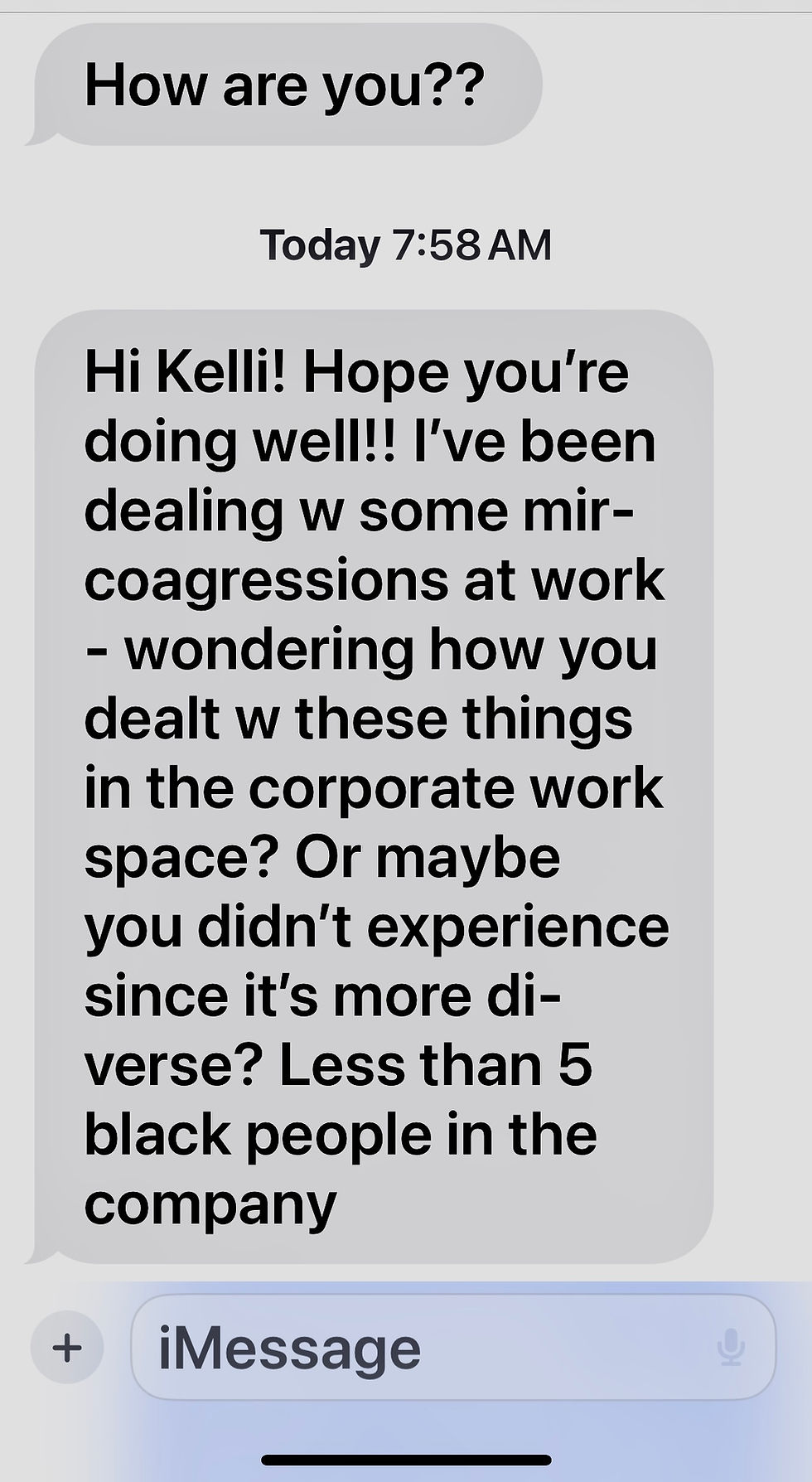It’s Not Just You: Bullying, Microaggressions & Harassment in Workplace
- mycoachkelli
- Jul 31, 2025
- 3 min read
Every time I get a message from a talented, hardworking professional who's questioning themselves because of constant tension, exclusion, or disrespect at work, it hits me hard.
They’re not burned out from the workload. They’re burned out from the culture. The side-eyes. The jokes that aren’t funny. The passive-aggressive, condescending comments. The being talked over and dismissed in meetings. The being left out of opportunities. The not being included in important decision making. And sometimes, simply being ignored.
This is what bullying, harassment, and microaggressions often look like in the 2025 workplace. Subtle, insidious, and easy to downplay. But let’s not sugarcoat it: It’s real. It’s harmful. And it needs to stop.
It chips away at people both emotionally and professionally.
They start second-guessing themselves.
They go quiet in meetings.
They emotionally disengage.
They stop bringing new ideas forward.
They leave. Not always loudly, but certainly for good.
This kind of workplace toxicity doesn’t just hurt individuals. It kills innovation, trust, and long-term retention. And most often, the most promising voices are the ones pushed out.
Ways to Respond if It’s Happening to You
Start documenting. Even small moments. Patterns tell a story.
Find support. Talk to someone you trust. A colleague, mentor, or a therapist.
Set boundaries. You are allowed to advocate for your dignity.
Know this: You are not too sensitive. You are not imagining it. And you are not alone.

What Leaders Must Do—Now
Leaders: The workplace culture is your responsibility. As the person in charge, you don’t get to stay neutral on behavior that harms your people.
✅ Call it out consistently. If someone’s tone, behavior, or treatment of others is disrespectful, address it immediately. Every time.
✅ Create safety. Make it clear your team can speak up without fear of retaliation.
✅ Be visible. Don’t wait for the exit interview to show you care.
✅ Back your values with action. It’s daily, consistent, intentional work. Don’t just talk about respect and inclusion, build systems that protect it. It's more than a slogan or tagline.
✅ Stop protecting toxic top performers. No one is above the standard for how people are treated, no matter their title or output.
✅ Lead the hard conversations. If it’s uncomfortable to talk about bias, exclusion, or power dynamics but do it anyway. That’s your job.
✅ Pay attention to what you tolerate. What you ignore becomes your culture. What you excuse becomes your legacy.
What Allies Must Do—Now
Allies have a responsibility to speak up, take action, and use their influence to challenge harm and uphold a culture of respect. Silence is not neutrality, it’s complicity.
🫱🏽🫲🏽 Interrupt harm in the moment. A simple “That’s not okay,” or “Let’s reframe that,” can shift the entire dynamic.
🫱🏽🫲🏽Back people up publicly. Agree with their ideas. Give them credit. Don’t let them be erased in meetings or conversations.
🫱🏽🫲🏽 Check in privately. A quick “Hey, I saw what happened—are you okay?” goes further than you think.
🫱🏽🫲🏽Speak up even when it’s uncomfortable. Allyship means risking a little of your own comfort to protect someone else’s dignity.
🫱🏽🫲🏽Challenge toxic norms. Just because “it’s always been that way” doesn’t mean it should stay that way.
The Bottom Line
This isn’t about being nice. It’s about being accountable. People deserve to feel safe, respected, and valued at work. Period.
Words on a wall don’t build culture. People do. And the time to act is now.





Comments